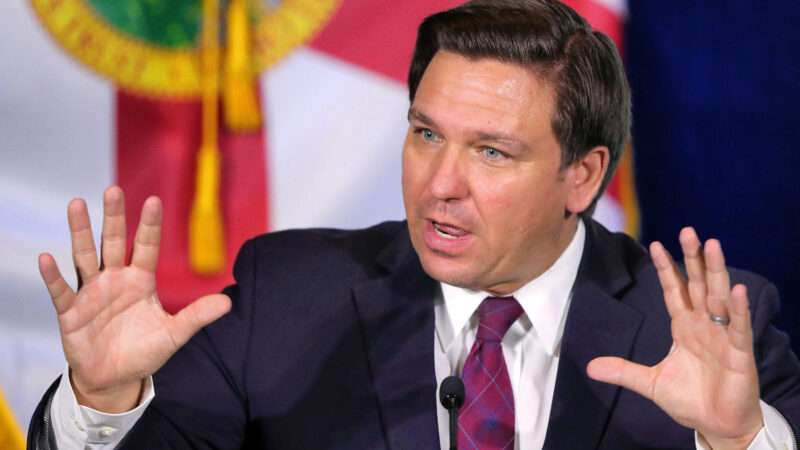
Republicans are taking aim at Disney over the media company's opposition to a new Florida law that critics call the "don't say gay" legislation.
"For Disney to come out and put a statement and say that the bill should have never passed and that they are going to actively work to repeal it, I think one was fundamentally dishonest, but two I think that crossed the line," Florida Gov. Ron DeSantis said. "This state is governed by the interests of the people of the state of Florida. It is not based on the demands of California corporate executives. They do not run this state. They do not control this state."
The governor told Fox News: "Disney has gotten over its skis on this.…When you are trying to impose a woke ideology on our state, we view that as a significant threat."
"We will not back down to woke corporations," Florida Lt. Gov. Jeanette Nuñez said.
Sen. Marsha Blackburn (R–Tenn.) complained to John Catsimatidis that "the woke left extremists are using corporations to push their agenda." Blackburn's comment to Catsimatidis, a politically active New York and Florida businessman who hosts an AM radio program, was reported by the New York Post.
It's ironic to hear the complaints from Republicans about politically active corporations, because for most of the past decade-plus, those complaining the loudest about corporate participation in politics have been Democrats, or Democrat-leaning independent socialists, complaining about gun manufacturers, oil companies, and health insurance companies.
In his 2010 State of the Union address, former President Obama attacked the Supreme Court justices sitting in the audience for their ruling in Citizens United. "Last week the Supreme Court reversed a century of law that I believe will open the floodgates for special interests—including foreign corporations—to spend without limit in our elections," Obama said. "I don't think American elections should be bankrolled by America's most powerful interests, or worse, by foreign entities."
In July 2010, Obama expanded on the point. "Because of the Supreme Court's decision earlier this year in the Citizens United case, big corporations—even foreign-controlled ones—are now allowed to spend unlimited amounts of money on American elections," Obama said. "Imagine the power this will give special interests over politicians. Corporate lobbyists will be able to tell members of Congress if they don't vote the right way, they will face an onslaught of negative ads in their next campaign."
Sens. Chuck Schumer (D–N.Y.), Dick Durbin (D–Ill.), Sheldon Whitehouse (D–R.I.), and Bernie Sanders (I–Vt.) went so far as to introduce legislation to amend the First Amendment to give Congress the power to limit campaign speech.
All of a sudden now that the politician is Republican Gov. DeSantis and his allies in the Florida legislature, and the corporate lobbyists are from Disney and are defending teacher speech on sex and gender issues—well, maybe Democrats will look differently at the value of corporate speech, or the downside of restricting it.
Obama in 2010 said, "This should not be a Democratic issue or a Republican issue."
Actually, it wasn't. The unconstitutional law that Obama was defending—and that the Supreme Court correctly struck down in Citizens United—was the Bipartisan Campaign Reform Act of 2002. It was known as McCain-Feingold after the 2008 Republican presidential candidate, former Sen. John McCain (R–Ariz.), who was one of its prime champions. It was signed into law by former President George W. Bush, a Republican, even though Bush had sworn an oath to preserve, protect, and defend the Constitution that included the First Amendment.
Why are politicians so hostile to corporate political speech?
Because in an era of expanded government power, shareholders and employees and customers in the form of a corporation are one of the few remaining restraints on politicians. Even the rule of law is hardly an obstacle. As Citizens United shows, the politicians had no trouble enacting an unconstitutional statute. When the Supreme Court scrapped it, Obama denounced the Court with the justices sitting right there in the audience. Then the leading senators proposed to rewrite the Constitution to give themselves more power.
People may differ on the merits of the Florida law. It states, in part, that "classroom instruction by school personnel or third parties on sexual orientation or gender identity may not occur in kindergarten through grade 3 or in a manner that is not age-appropriate or developmentally appropriate for students in accordance with state standards."
If that law reminds liberals that banning corporate speech doesn't advance liberty, it may yet serve some constructive purpose. Politicians only have to face voters every two or four years. But businesses have to earn the confidence of customers, employees, and shareholders—with widely varying opinions—on an ongoing basis. More dangerous even than "woke" corporations are unconstrained politicians.
The post Republicans Taking Aim at Disney Is a Reminder That Both Parties Are Hostile to Free Speech appeared first on Reason.com.







